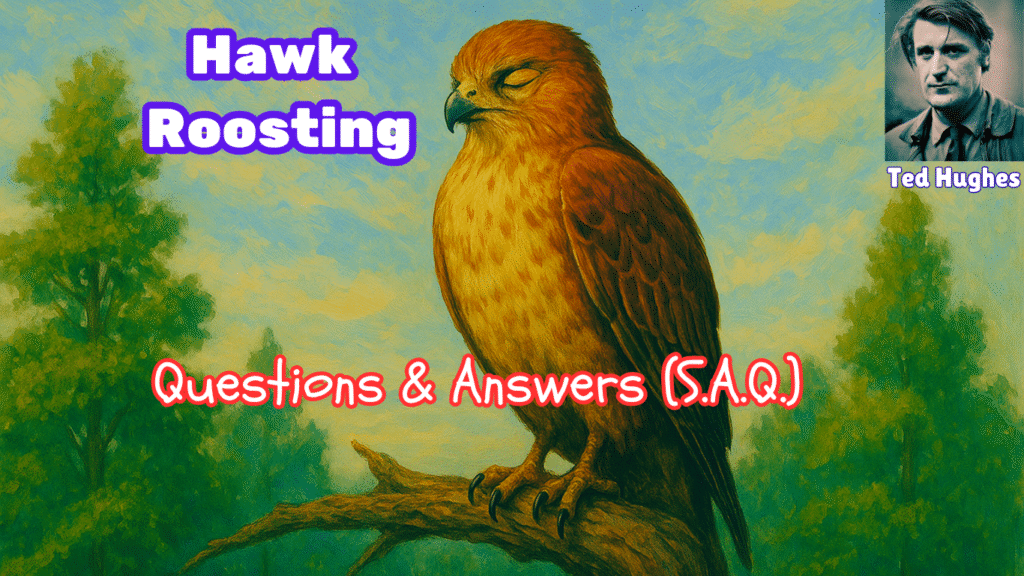
1) Who is the speaker in the poem Hawk Roosting? Where is the Hawk sitting?
Ans. In the poem “Hawk Roosting”, the speaker is the hawk itself. The poem is a dramatic monologue where the hawk speaks in the first person, expressing its thoughts, pride and authority.
The hawk is sitting at the top of the wood.
2) What does the phrase ‘I sit in the top of the wood’ suggest?
Ans. The phrase suggests the hawk’s dominant position and control. It indicates that he parches at the highest point of the forest, symbolising supreme power and authority over all the creatures. It also shows the hawk’s pride and self-confidence.
3) “I sit in the top of the wood, my eyes closed.”- Why does the Hawk sit with eyes closed?
Ans. The hawk sits with eyes closed because it feels complete confidence and secure. He has control over the surroundings. He believes that no one can challenge his strength and authority. So, he does not need to stay alert.
4) What does the hawk say about his closed eyes?
Ans. The hawk says that his closed eyes do not mean that he is relaxing or absorbed in false fantasies. But he remains alert while he is inaction or asleep.
5) What does the hawk do in sleep?
Ans. In his sleep, the hawk does not indulge himself in deceptive illusion or unnecessary thoughts. Instead of that, it rehearses perfect killing and eating its prey.
6) Why are high trees advantageous to the hawk?
Ans. High trees are advantageous to the hawk because the high position helps it to get air’s buoyancy and to get a clear view of the earth with the help of the sun’s rays.
7) What does the hawk mean by ‘the air’s buoyancy and the sun’s rays’?
Ans. By these words, the hawk means that nature itself supports him a lot. The air helps him to fly spontaneously. The sun gives him the light and warmth.
8) How does the Earth help the hawk with its inspection?
Ans. The earth always faces the sky upwards. It helps the hawk to inspect and detect its prey from high.
9) “And the earth’s face upward for my inspection.” What is the figure of speech used in this line?
Ans. The figure of speech used in this line is personification. The earth has been personified here as it faces upward like a human being.
10) What are the physical features that made the hawk an expert hunter?
Ans. The hawk has a hooked beak, hooked feet, sharp eyesight and light feathers. These are the physical features that made her an expert hunter.
11) Where are the hawk’s feet locked? What does it mean by this?
Ans. The hawk’s feet are locked upon the rough bark of a tree.
By these, he wants to mean he holds the tree by its strong grip. No force can move him against his will.
12) “It took the whole of creation /To produce my foot, my each feather.” – What does the hawk mean by the lines?
Ans. The hawk means that all of nature’s forces work together to make him so powerful and deadly. He believes that his sharp claws and strong wings were created so perfectly, making him a skilled Predator.
13) “Now I hold creation in my foot.” – What does the hawk mean by this line?
Ans. By this line, the hawk means that now he has the absolute power to control everything on this earth. The entire creation is under his control. The line shows the hawk’s arrogance, pride and dominance.
14) Why does the hawk fly up and revolve slowly?
Ans. The hawk flies and revolves slowly in the sky to observe every minute detail below, like its prey and domain.
15) “I kill where I please because it is all mine.” – What does the hawk mean by this line?
Ans. The hawk believes that he has the absolute power and authority over everything on this earth, like a king or God. He can kill any creature whenever he wishes without any fear. ‘It is all mine’ by the sentence, he means to say that the whole world belongs to him.
16) Why does the hawk say ‘There is no sophistry in my body’?
Ans. The hawk is straightforward in his nature. He does not pretend or use any trick to kill any creature. He is purely driven by his instinct, and his instinct is ruthless.
17) How does the hawk describe his manner?
Ans. The manner of the hawk is ruthless. It tears off the head of other animals. It is his natural way of behaving. He describes that there is no sophistry in his body.
18) “The allotment of death.”- What does the line suggest?
Ans. Allotment means distribution or assignment. The line suggests that the hawk will decide who will die and when they will die. The line reflects the hawk’s arrogance, power, and God like attitude, deciding the fate of other creatures.
19) “No arguments assert my right.”- What is the right of the hawk? How does he justify his rights?
Ans. The right of the hawk is to kill any creature whenever it wishes.
The authority of the hawk needs no justification. His power is natural and unquestionable. No one can challenge or put forth any argument.
20) “The sun is behind me.” – What does the hawk want to say by this line?
Ans. The hawk means that the sun is always supporting him. The sun gives him warmth, strength and guidance standing behind him.
21) “Nothing has changed since I began.”- What does the hawk mean by this line?
Ans. The hawk means that since he came into existence, his power, his authority and his role as a predator have not changed. The world has stayed as it was – under his rule.



